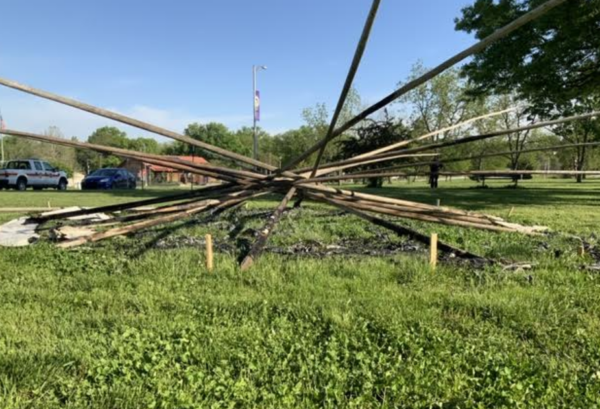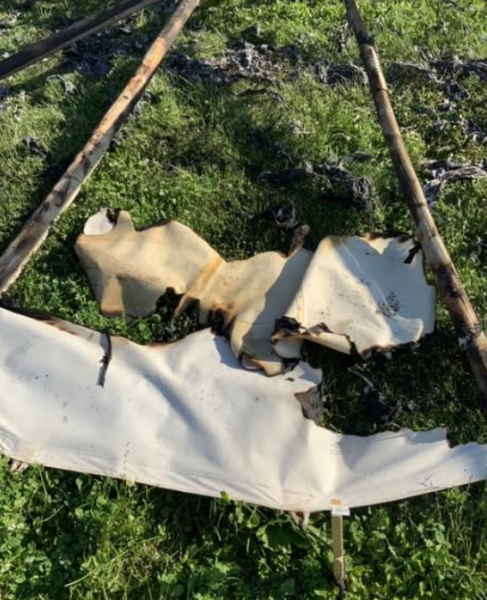
- Details
- By Levi Rickert
LAWRENCE, Kan. — The teepee erected to honor the spring graduates at Haskell Indian Nations University in Lawrence, Kansas was not a mere reminder of housing of our tribal ancestors. It was meant to remind graduating students that “you stand on your own,” according to Jared Nally (Miami Tribe of Oklahoma).
Early Saturday around 4:30 a.m., Lawrence-Douglas County Fire Department was called to the university campus because the teepee was on fire.
Nally, editor of the Indian Leader, Haskell’s student newspaper, spoke by telephone to Native New Online on Saturday afternoon about the fire that destroyed the teepee. Nally said the teepee was erected on Wednesday and to be taken down today.
“I feel like this is a symbol of Native resiliency. A teepee comes together with each part supporting another. I look at what remains after the fire, and even though there has been a tragedy, you still see the poles supporting one another,” Nally said.
The Indian Leader posted the following on its Facebook page: “Following the suppression of the flames, a member of the Lawrence Fire Department started collecting evidence to determine the cause of the fire. Current knowledge is that no fire was lit in the (teepee), and that the ceremonial fire off to the side had already gone out.”
Later on Saturday, the Lawrence-Douglas County Fire Department released a short statement about the teepee fire:
 The fire was extinguished before the wooden poles burned.
The fire was extinguished before the wooden poles burned.
“At 4:35 a.m., the Douglas County Emergency Communications Center was notified by a Haskell security guard of a teepee on fire near the intersection of Barker and Indian Avenue. Firefighters arrived at 4:42 a.m. and extinguished a small amount of fire remaining on the teepee with a fire extinguisher. The department, in coordination with other agencies, is conducting an investigation of the fire at the request of Haskell Indian Nations University.”
Nally said there was speculation that fire was an act of vandalism.
Because of the COVID-19 pandemic only about 50 students remain on campus. As with other higher education institutions, Haskell has been conducting classes online.
Instead of an in-person commencement, there was a virtual graduation ceremony held on Friday. Remarks from four people inside the teepee were livestreamed, including a prayer and a song.
Haskell Indian Nations University is a federally operated university. Haskell was originally an Indian boarding school when it was established in 1884. It now has a student population of 1,000 each semester with American Indians from over 140 enrolled.
Notable Haskell alumni include multi-sport athlete Jim Thorpe, Olympian Billy Mills, Congresswoman Sharice Davids and National Indian Gaming Association Chairman Ernest Stevens, Jr.
Editor's Note: Jared Nally contributed to this article from Lawrence, Kansas.
More Stories Like This
Native News Weekly (August 25, 2024): D.C. BriefsUS Presidents in Their Own Words Concerning American Indians
Native News Weekly (January 4, 2026): D.C. Briefs
What Native American Members of Congress Are Saying about the Venezuela Operation
Ramos Measure Seeks to Prevent Suicides at High-Risk Bridge Sites
Help us defend tribal sovereignty.
At Native News Online, our mission is rooted in telling the stories that strengthen sovereignty and uplift Indigenous voices — not just at year’s end, but every single day.
Because of your generosity last year, we were able to keep our reporters on the ground in tribal communities, at national gatherings and in the halls of Congress — covering the issues that matter most to Indian Country: sovereignty, culture, education, health and economic opportunity.
That support sustained us through a tough year in 2025. Now, as we look to the year ahead, we need your help right now to ensure warrior journalism remains strong — reporting that defends tribal sovereignty, amplifies Native truth, and holds power accountable.
 The stakes couldn't be higher. Your support keeps Native voices heard, Native stories told and Native sovereignty defended.
The stakes couldn't be higher. Your support keeps Native voices heard, Native stories told and Native sovereignty defended.
Stand with Warrior Journalism today.
Levi Rickert (Potawatomi), Editor & Publisher

